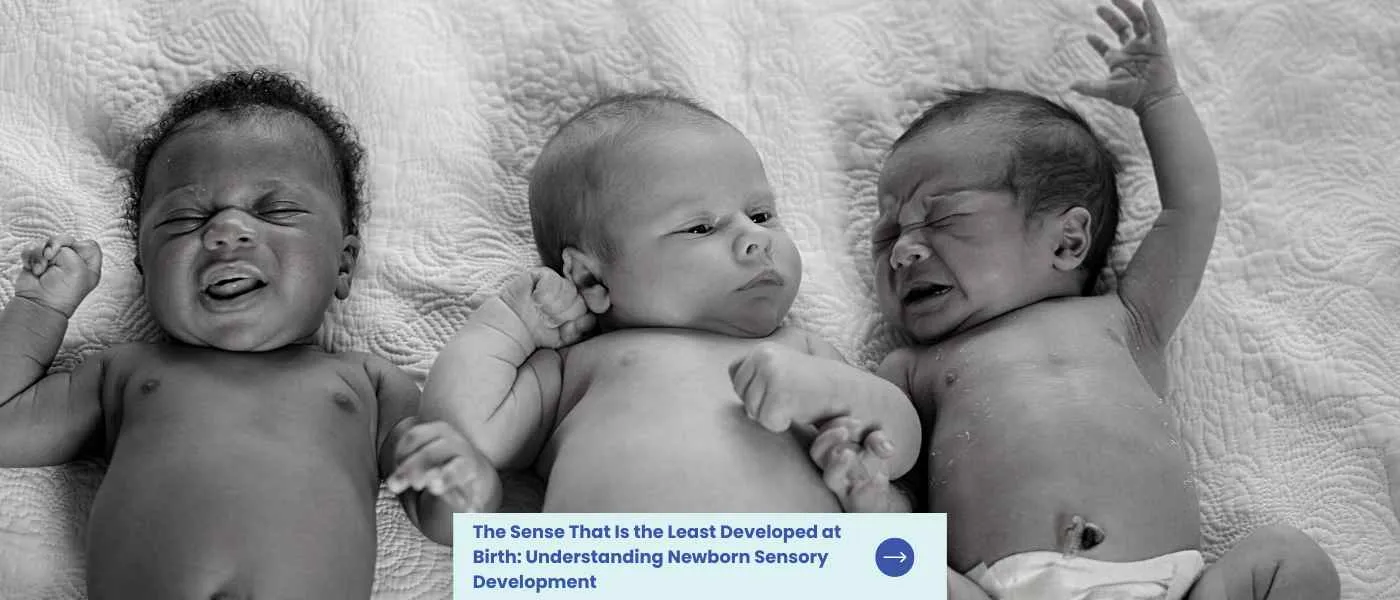From the moment a baby is born, they begin to experience the world through their senses. However, not all of their senses are equally developed at birth. In fact, one sense in particular is significantly less developed than the others.
Understanding which sense is the least developed at birth and why can help parents and caregivers better support their newborn’s sensory development.
In this article, we’ll take a closer look at this sense and how it fits into the broader picture of newborn sensory development.
Key Takeaways on Newborn Senses
- The sense that is the least developed at birth is touch, which is crucial for bonding, emotional regulation, and physical development.
- Infants with normal hearing should startle upon hearing familiar loud noises and voices, and allows them to pay quiet attention to their mother’s voice or father’s voice.
- Sensory development in newborns is a complex and ongoing process, with each sense developing at its own pace and in response to different experiences and stimuli. Understanding this process can help parents and caregivers provide the best possible environment for their newborn’s growth and development.
Unlocking the Magic of the Five Senses
The five senses – sight, hearing, taste, smell, and touch – are the primary means through which we perceive and interact with the world around us.
Sight is the sense that allows us to see and distinguish different shapes, colors, and patterns. It works by capturing light through the eyes and transmitting that information to the brain for interpretation.
Hearing is the sense that enables us to perceive sound and speech. It works by capturing sound waves through the ears and translating them into electrical signals that are sent to the brain for processing. For instance, babies with normal hearing startled as a response to loud sounds.
Taste and smell work together to help us differentiate between different flavors and scents. Taste is primarily detected through the tongue, which contains taste buds that can distinguish between sour or bitter tastes, salty or sweet tastes and umami flavors. Babies also prefers the taste of human milk or breast milk.
Smell, on the other hand, is detected by specialized cells in the nasal cavity that are able to distinguish between a wide range of different odors. Babies prefer the small of their mothers, especially her breastmilk.
A baby’s sense of touch allows them to feel pressure, temperature, pain, and other sensations. It is mediated by receptors in the skin, muscles, and other tissues that send signals to the brain for processing.
Overall, the five senses work together to give us a comprehensive understanding of our surroundings and to help us navigate the world around us.

The Power of Touch: Why It’s the Least Developed Sense at Birth and How It Shapes Infant Development
When babies are born, their senses are not all equally developed. While some senses, like hearing, are quite advanced at birth, others take longer to mature. One sense in particular that is underdeveloped in newborns is touch.
Despite its lack of development, touch plays a vital role in infant development and is essential for building emotional connections and physical well-being.
Why Touch Is the Least Developed Sense at Birth
At birth, the nerve endings in a baby’s skin are not fully mature, which means that touch is not as sensitive or refined as it will become later in life. Additionally, newborns are not yet able to regulate their own body temperature, which can make them more sensitive to touch. This means that too much or too little touch can be uncomfortable or even painful for a newborn.
The Role of Touch in Infant Development
Despite being the least developed sense at birth, touch plays a critical role in infant development. Breastfeeding babies automatically spend most of their feeding time while on their mother’s arms.
Touch is how babies begin to explore and understand their environment. Through touch, infants learn about different textures, temperatures, and surfaces. Touch also helps young infants develop a sense of their own bodies and physical boundaries.
Beyond physical development, touch is also important for building emotional connections between newborn babies and their own mother. Touch has been shown to be vital for regulating emotions and reducing stress in both babies and adults.
Skin-to-skin contact, in particular, has been linked to improved physical and emotional outcomes for newborns. For instance, you can place your hand on your baby’s belly to make your baby feel secure.

Nurturing Touch in Newborns
Given the importance of touch in infant development, it’s crucial for caregivers to nurture this sense in newborns. This means providing gentle, soothing touch through activities like massage, swaddling (or wrapping baby snugly with a soft blanket), and holding.
If you plan to swaddle your baby, make sure you don’t use thick blanket especially during warm weather because it can make your baby overheat. Use a lighter blanket instead or you can buy a special swaddling blanket designed for swaddling.
Also, to avoid the risk of of a problem called hip dysplasia and dislocation, it’s important to not position your baby’s legs together and straight down, as this may hinder proper growth and development of the hip joints.
While most newborn babies feel secure when swaddled, this increases the risk of Sudden Infant Death Syndrome (SIDS), especially when the swaddled baby rolls onto their stomach.
For example, newborns prefer more stimulation, while others may be more sensitive and need less touch.
While touch may be the least developed sense at birth, it is a critical aspect of newborn development. By understanding the role of touch in building physical and emotional connections, caregivers can provide the best possible environment for their baby’s growth and well-being.
Why Hearing Is the Most Developed Sense at Birth
The auditory system begins to develop early in fetal development, which means that by the time a newborn baby is born, their hearing is already well-developed. Additionally, hearing is essential for communication and social interaction, which are critical for a newborn’s survival and development.
Newborns are also able to recognize familiar sounds and voices within hours of being born, which highlights the advanced nature of their hearing.
The Role of Hearing in Newborn Development
Hearing plays a vital role in newborn development, particularly in the areas of language and social interaction.
Research has shown that babies who are exposed to language early in life have better language skills later on, highlighting the importance of early auditory experiences. Hearing is crucial for developing social bonds with caregivers and for understanding the emotions and intentions of others.

Nurturing Hearing in Newborns
Given the importance of hearing for newborn development, it’s crucial for caregivers to nurture this sense in their babies. This means talking and singing to babies regularly, exposing them to a variety of sounds, and responding to their vocalizations and gestures.
It also means being mindful of the impact of noise on newborns and providing a quiet and calming environment when possible.
Hearing may be the most developed sense at birth, but it’s just the beginning of a lifelong process of sensory development. By understanding the importance of hearing in newborn development and taking steps to nurture this sense, caregivers can provide the best possible environment for their baby’s growth and well-being.
The Development of the Newborn’s Senses
As newborns grow and develop, their senses continue to mature and become more refined. Understanding the developmental milestones of each sense can help caregivers provide appropriate stimulation and support the senses your baby develops.
Sight
Sight is one of the senses that undergoes the most significant changes in the first few months of life. At birth, babies can detect light and dark, as well as high-contrast patterns like black and white stripes. This is the reason why most infant toys and baby books have distinct black and white patterns.
They can only focus their sight at close range — distance between the mother’s face to the baby when cuddling close. Moreover, they already have visual tracking for the first few weeks but have uncoordinated eye movements.
Over time, they will develop normal vision, depth perception and visual acuity, and they become able to distinguish between colors, track moving objects, and perceive depth and distance.

Hearing
Infants are born with the ability to hear. Even when they were still in the womb, many mothers find that they can feel their babies react to soothing music. Hearing is fully developed and continues to develop rapidly in the first year of life. They will have their hearing screened at the hospital upon birth.
By around 6 months of age, babies are able to detect subtle differences in speech sounds and are beginning to understand basic words and phrases. By 12 months, most babies are able to recognize and respond appropriately to a variety of familiar sounds and voices.
Interestingly, babies prefer higher pitched voice such as those of their mothers’ over low sounding voice of their fathers.
Smell & Taste
Babies have an early preference of sweet tastes over sour or bitter tastes.
Over time, their taste preferences become more refined and they become more responsive to a wider range of flavors. You will notice babies react to different tastes using distinct facial expressions. Similarly, newborns are able to distinguish between a limited number of odors, but their sense of smell improves over time as they are exposed to a greater variety of scents.

Touch
Babies begin to develop a sense of touch early on, but it takes time for their touch sensitivity and discrimination to become more refined. Touch is perhaps the most complex sense in terms of development, as it is mediated by a wide range of nerve endings and receptors. Through experience and exploration, babies learn to differentiate between different textures, temperatures, and surfaces.





